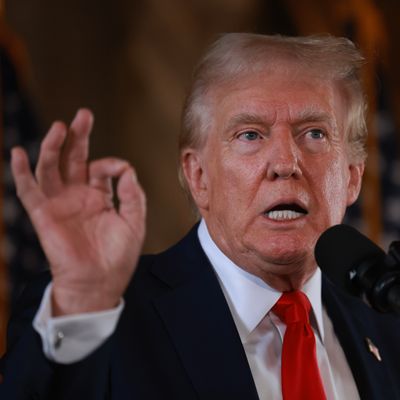

Photo: Joe Raedle/Getty Images
The presidential election received yet another twist last week as Donald Trump’s campaign disclosed that it was the victim of a hack by a foreign entity that managed to obtain private materials. The announcement came as news organizations reported receiving internal campaign documents via email from an anonymous source and as Microsoft unveiled a new report warning of malicious online influence in the election from Iran. Here’s what we know so far.
On Friday, Microsoft issued a report from its threat-analysis center detailing its concerns about Iran attempting to influence the presidential election. In an accompanying blog post, the company said that groups with ties to the Iranian government have begun to use influence campaigns on election-related topics to potentially sway voters as well as initiating operations to gather intelligence on political campaigns.
“Yet another Iranian group, this one connected with the Islamic Revolutionary Guard Corps, or IRGC, sent a spear phishing email in June to a high-ranking official on a presidential campaign from the compromised email account of a former senior advisor. The email contained a link that would direct traffic through a domain controlled by the group before routing to the website of the provided link,” the company wrote.
The following day, Trump campaign spokesman Steven Cheung acknowledged that campaign data was compromised, blaming “foreign sources hostile to the United States” for the hack in a statement.
Trump himself confirmed the news on TruthSocial, writing, “We were just informed by Microsoft Corporation that one of our many websites was hacked by the Iranian Government – Never a nice thing to do! They were only able to get publicly available information but, nevertheless, they shouldn’t be doing anything of this nature.”
Some of the information accessed from the hack appears to have made its way to several news organizations. On Saturday, Politico reported that it began receiving emails containing Trump campaign documents from an anonymous account on July 22. The missives originated from an AOL email address and from an individual who would identify themself only as “Robert.” According to the outlet, the emails contained internal communications from a top Trump campaign official as well as a 271 page dossier on Trump’s running mate, Ohio senator J.D. Vance, believed to be part of a vice-presidential vetting file assembled on him. Also included was a portion of a research document on Florida senator Marco Rubio, who was also under consideration to join Trump on the Republican presidential ticket.
Politico verified the documents’ veracity, but could not establish the hacker’s motive or identity. The New York Times and the Washington Post have since reported receiving what appears to be the same documents sent to Politico from the same source. It’s not clear if other documents or materials were stolen in the hack.
In a statement to the Associated Press, Iran’s mission to the United Nations denied having any involvement in the Trump-campaign hack. “The Iranian government neither possesses nor harbors any intent or motive to interfere in the United States presidential election,” they said.
Tensions between Trump and the Iranian government have only grown since his time in the White House. After an attempt was made on Trump’s life in July, reporting emerged that U.S. intelligence had recently become aware of an Iranian assassination plot against Trump, notifying the Secret Service, which then increased its security around the Republican candidate. The rumored plot is believed to be tied to Trump’s authorization of a\the military air strike in 2020 that killed Qasem Soleimani, a top commander in Iran’s Islamic Revolutionary Guard Corps. The incident in Butler, Pennsylvania, was later deemed to be unrelated. Iran has denounced the allegations of a plot against Trump as “unsubstantiated and malicious,” per CNN.
Source link




